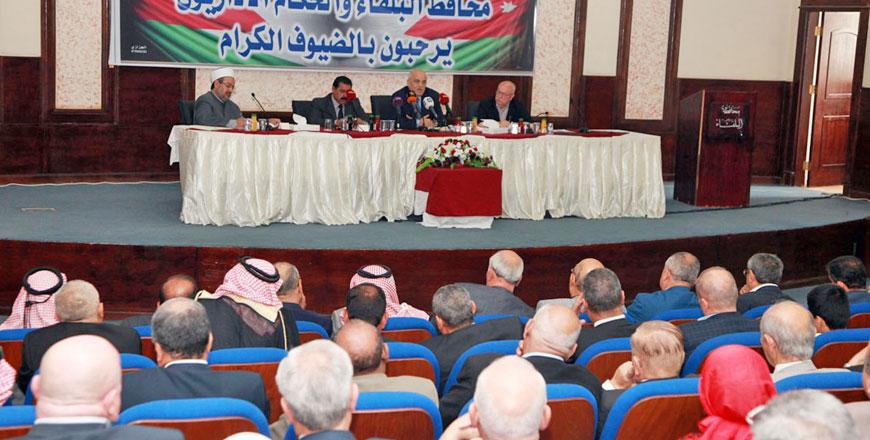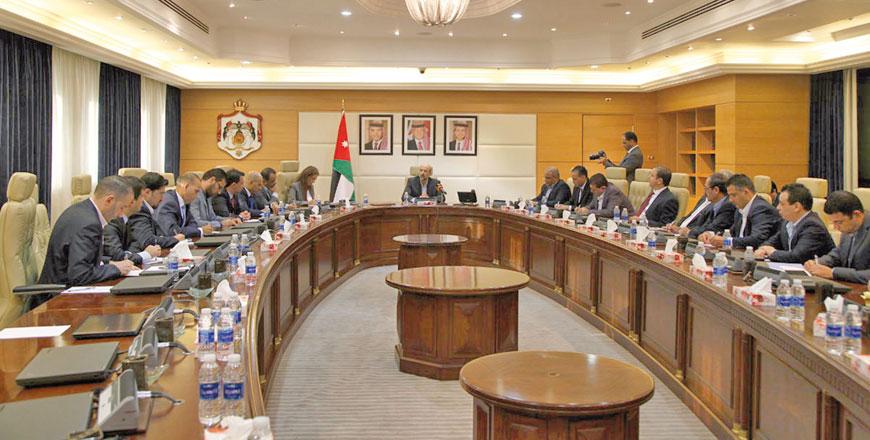You are here
Razzaz urges citizens not to ‘prejudge’ new tax law
By JT - Sep 13,2018 - Last updated at Sep 13,2018

Deputy Prime Minister and Minister of State Rajai Muasher speaks during a meeting with citizens and notables in Balqaa on Thursday (Petra photo)
AMMAN — The government is fully aware that no Income Tax Law in the world can be accepted by all citizens, Prime Minister Omar Razzaz said on Thursday.
During a meeting at the Interior Ministry with administrative governors and directors of security apparatuses, Razzaz urged all classes of society to analyse the income tax bill and understand it before making prejudgements, the Jordan News Agency, Petra, reported.
The premier stressed that the draft law is not aimed at collecting money, asking the public to not be influenced by the discourse of a small category affected by the bill.
Also on Thursday, Deputy Prime Minister and Minister of State Rajai Muasher described the income tax draft law as “integrated” and a national interest that came after a thorough study of its impact on all industrial sectors.
During a meeting with citizens and notables in Balqaa to discuss the bill and receive citizens’ feedback, Muasher, who was accompanied by a ministerial team, said that the bill considers both Jordanians’ ability to pay, and the country’s need, Petra, reported.
The minister noted that the government’s recent decisions to lower the sales tax on main commodities mark the beginning of a way to reconsider the sales tax as a new economic approach in the Kingdom.
He added that 88 per cent of the Social Security Corporation subscribers and military retirees whose salaries are less than JD3,500 will not be affected by the draft law.
Muahser said that the Parliament is the authorised side to make the final version of the law after comprehensive discussions with various industrial sectors, stressing that the government had published a copy of the bill on the website of the Legislation and Opinion Bureau for 10 days to receive views.
He added that the government concluded that the majority of tax burden sources, equal to 26.5 per cent of the gross domestic product, resulted from the sales tax and is three times that of the income tax, which expands the gap between the rich and poor.
The minister added that studies by the Economic and Social Council estimated tax evasion amounted to some JD650 million, noting that the total domestic and external debts stand at JD28 billion, constituting 96 per cent of the GDP.
He said that the government will be flexible on the industrial sector to allow it to adapt to the new law.
Muahser noted that the government works within two routes, with the first aiming at addressing time-sensitive problems of citizens who need quick decisions by the government, under what is known as the “100-day programme”, whereof on September 22 the government would have honoured its commitment in this route.
As for the second route, the government embarked on drawing a national action programme focused on three aspects: The first concentrates on the state of law and law sovereignty and determining the political course until reaching parliamentary governments, the minister said.
The second aspect focuses on services provided by the government, while the third entails stimulating the economic growth, Muasher said, adding that it is unacceptable to have 2 per cent growth rates while the required rate to overcome the economic crisis should exceed 5 per cent.
He added that the country needs JD8 billion, JD6 billion of which is used to cover salaries and debts, JD1 billion to cover health expenditures and bread subsidies, and JD1 billion for other expenditures.
Income and Sales Tax Department director general, Hussam Abu Ali, said that the new bill eradicated randomness in estimating the levies imposed on taxpayers.
Speaking to the Jordan Television’s “Money and Business” programme, Abu Ali noted that when revisiting the law studies showed faults in the old version that lacked items deterring tax evasion, according to Petra.
Political and Parliamentary Affairs Minister Musa Maaytah and minister of state for legal affairs, Mubarak Abu Yamin, on Thursday visited Karak as part of the government’s discussions with the public on the income tax bill.
The ministers acquainted citizens with amendments to the bill and listened to their views, as part of the government’s dialogue with society that will continue until reaching a consensual law, Petra reported.
Related Articles
AMMAN — The new income tax draft law was developed “without any dictations from any entity and will help achieve the desired fiscal reform”,
AMMAN — Senate and Lower House Finance Committees' Presidents MPs Raji Muahser and Ahmad Safadi on Friday stressed the importance of directi
AMMAN — Deputy Prime Minister and Minister of State Rajai Muasher on Friday said that, citing figures by Association of Banks in Jordan, 63












